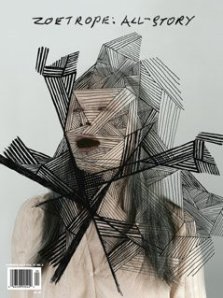
This issue’s artwork is done by the ultimately talented musician/artist Antony of Antony and the Johnsons. (In a conversation he has surely forgotten, Antony once told me of the time Cat Power pecked him on the lips at a show. He followed his story with something along the lines of “I’m gay as they come, but I asked her to marry me anyway.”) This spring, Antony curated a group show in Beaubourg, Paris called Six Eyes at the Galerie du Jour Agnès B. (Unrelated, the gallery is now showcasing an exhibition of odes and reflections on New York by artist and filmmaker Jonas Mekas called “I Want to Share With You, My Paris Friends” On the website, a black-and-white photo is shown of an old man in a hat reading The Brooklyn Rail. Sweet.) Antony also had his first solo visual exhibition–and if you haven’t seen his artwork or his videos, he’s a pretty damn visual guy–at Isis Gallery in London. Other contributors to this quarter’s Zoetrope include Kurt Vonnegut, Ryu Murakami, Lysley Tenorio, Pasha Malla, and Francis Ford Coppola (who created the journal). Coppola provides us the beginning of a short-story version of his new film Tetra.
It’s always exciting to read a newly published story by such a revered writer as Kurt Vonnegut, and “The Nice Little People”–in which tiny people climb out a penknife into a sadly feeble man’s life–is short and sweet, which is exactly what a Vonnegut story should be. To me, reading Kurt Vonnegut is like drinking absinthe: done quickly before you have a chance to decide whether it was the right choice or whether you even enjoy the way it tastes. Like drinking absinthe, you read Vonnegut because your friends hail its hallucinatory effects, of which you have yet to experience, and since it’s absinthe (and since it’s Vonnegut), you keep lighting that damn sugar cube, hoping once and for all for a green, wall-bending night you’ll never forget. It’s not that absinthe is bad–although the aftertaste is questionable–it’s just that somehow you keep missing out on all that wondrous transcendence.
I’d alternatively highlight “Monsters” by Pasha Malla, author of The Withdrawal Method recently published by Soft Skull Press, in which an apathetic young man becomes preoccupied with ordering an expensive sea animal, a “monster,” at a Chinese restaurant. (His friends want fried rice). Like Vonnegut’s, Malla’s story is quite short. And if a Vonnegut piece is a shot of potent liqueur, Malla’s is a glass of cold water: easy and painless, gulped without forethought, but in the end sustaining and requisite.
